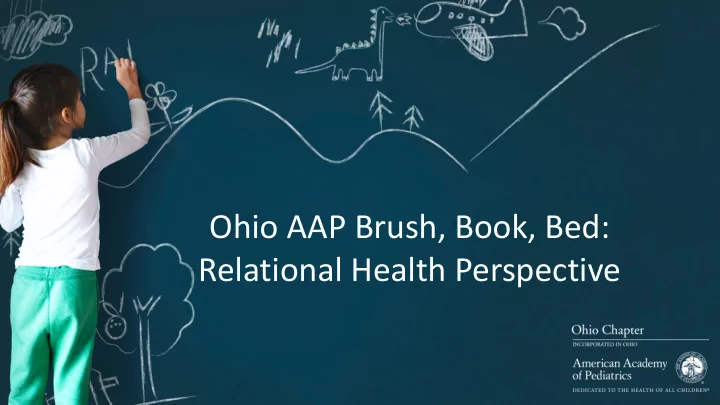

Ohio AAP Brush, Book, Bed: Relational Health Perspective
CME Disclaimer I have no personal financial relationships in any commercial interest related to this CME. I do not plan to reference off label/unapproved uses of drugs or devices. James Duffee, MD, MPH james.duffee@wright.edu
Learning Objectives • Promote positive oral health routines with patients beginning at 6 months of age • Understand and implement fluoride varnish procedures • Discuss early literacy with families during pediatric well visits and other encounters • Improve knowledge of appropriate sleep habits and advise patients with sleep related concerns
Relational Health in Primary Care: Attachment and Resilience
Relational Health and Attachment • Emotional bonds are basic for survival • Care seeking/care giving are complimentary • Secure attachment – Seeks primary (secure base) when distressed – Curious, exploring environment – Self-confident – Asks for help • Insecure attachment – Avoidant (internalizing) – Resistant (externalizing) • Ambivalent, chaotic, disorganized attachment John Bowlby 1907-1990
Secure Attachment • Seeks primary (secure base) when distressed • Curious, exploring environment • Self-confident • Asks for help
Insecure Attachment Patterns Avoidant Anxious (Resistant) • Passive, withdrawn • May be charming , clinging or overactive like ADHD • Seldom seeks comfort • Entertaining to adults, may be indiscriminant • Avoids feelings, doesn’t express distress • Separation anxiety- manages closeness to quiet • Low expectations anxiety • Develops when caregiver is unresponsive or • Develops when caregiver response is rejecting inconsistent • May live life without the expectation of being • May seek early romantic relationships loved
Disorganized or Chaotic Attachment • Defiant, controlling • Betrayal trauma • Lacks empathy, may be openly angry or superficially charming, aggression, promiscuity • Adolescent may show extreme self- reliance but focus on injustices done to them
Attachment Styles https://www.positive-parenting-ally.com/attachment-styles.html
www.circleofsecuritynetwork.org
Resilience “We must never forget that we may also find meaning in life even when confronted with a hopeless situation, when facing a fate that cannot be changed.” Victor Frankl, MD
Resilience: Ability, Process, Result, Activity • The ability to avoid physiologic and behavioral damage from exposure to chronic stress • The process of adapting well in the face of adversity • The result of using protective factors to manage multiple stressful circumstances without toxic effects • Transforms toxic stress to tolerable stress
Foundations of Resilience • At least one stable, caring, and supportive relationship • A sense of self-efficacy or mastery over life circumstances • Strong executive function and self- regulation • Solid grounding in faith or cultural traditions http://www.artic.edu/aic/collections/artwork/111442
• Sense of humor • Ability to form attachments • Inner psychological space that protects Other – Inner locus of control – Tendency to grow when presented with adversity Character • Three you can’t do without Traits – Flexibility, ability to improvise – Acceptance of reality – Strong faith that life has meaning
Resilience Can Be Learned • Important relationships vary over the life course – Parents, grandparents, siblings, peers, intimate partners – Grounded in early experiences • Self-regulation and other executive functions stimulated in early childhood • Non-cognitive skills (empathy) can be taught as late as adolescence • Contemporary emphasis on two-generational interventions
Promote Relational Health in Primary Care • Promote Safe, Stable, Nurturing Relationships and Environments • Engage Serve and Return • Recognize temperament variations • Understand response to stress and trauma, normal and maladaptive • Caveat: Psycho-education insufficient. Must improve attachment and relational health
Promote Caretaker Resilience • Identify strengths and protective factors in the family, nurture parental self- esteem • Encourage social connectedness • Remember that being connected means giving help in addition to receiving help • Provide guidance, mentoring to improve self-efficacy • “put the oxygen mask on yourself first” • Encourage self-reflection in parent, child and mutual activities, keep child in mind
Encourage Social Connections • Support the child’s ability – to learn, – to use imagination in play, and – to identify with community • Develop child’s awareness and self-regulation of feelings, – ability to identify feelings in others and – communicate own feelings to others
Resilience and Relational Health The most important and frequent commonality of children who succeed is that they have had a least one stable and committed relationship with a supportive parent, caregiver or other adult. Harvard University Center on the Developing Child http://developingchild.harvard.edu
Caregiver Support and Hippocampal Development • 127 children studied longitudinally • Significant effect of early childhood maternal support on hippocampal volume growth • Growth trajectory is associated with later emotion functioning. Luby et al. Preschool is a sensitive period for the influence of maternal support on the trajectory of hippocampal development. PNAS . 2016. www.pnas.org/cgi/doi/10.1073/pnas.1601443113
Stress, Hippocampal Development and Maternal Buffering • Cohort followed for 20 years, ecologic in home assessments • Associations between – parental nurturance and memory development – environmental stimulation and language development • Supports concept of maternal buffering of stress hormone effects on hippocampal development • “Memory is particularly vulnerable to life in low SES settings. One of the specific factors affecting memory is parents’ ability to be responsive and supportive under the stressful circumstances of poverty. “ Farah, M. J., Betancourt, L., Shera, D. M., Savage, J. H., Giannetta, J. M., Brodsky, N. L., … Hurt, H. (2008). Environmental stimulation, parental nurturance and cognitive development in humans. Developmental Science, 11, 793–801. doi: 10.1111/j.1467- 7687.2008.00688.x
http://ohioaap.org/brushbookbed
Recommend
More recommend